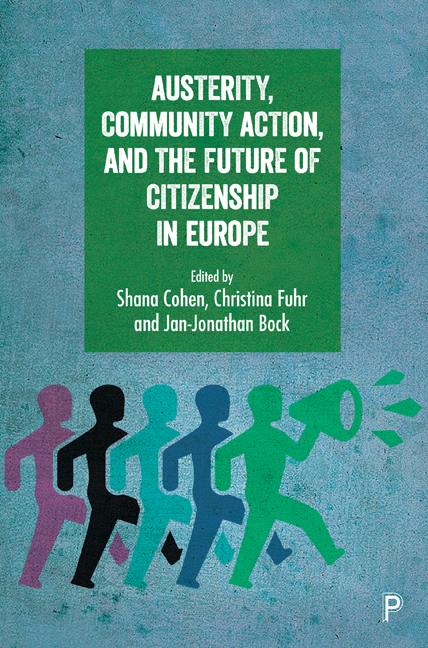Book contents
- Frontmatter
- Dedication
- Contents
- Acknowledgements
- Notes on contributors
- one Introduction: social activism, belonging and citizenship in a period of crisis
- Part I The social consequences of welfare policy
- Part II The practice of social good
- Part III Social change and neoliberalism
- Part IV Situating solidarity in perspective
- Index
Eight - The Tafel and food poverty in Germany
Published online by Cambridge University Press: 05 April 2022
- Frontmatter
- Dedication
- Contents
- Acknowledgements
- Notes on contributors
- one Introduction: social activism, belonging and citizenship in a period of crisis
- Part I The social consequences of welfare policy
- Part II The practice of social good
- Part III Social change and neoliberalism
- Part IV Situating solidarity in perspective
- Index
Summary
After the fall of the Berlin Wall in 1989 and the reunification of Germany in 1990, the country found itself caught in a state somewhere between euphoria and shock. For the majority of the population, ‘that which belonged together had finally been brought together’, to paraphrase the former West German Chancellor Willy Brandt. At the same time, the sheer dimension of reconstruction, restoration, and assimilation efforts to bring East German states on par with western standards became clear. The notion of ‘recovery east’ (Aufschwung Ost) coined by Helmut Kohl, the chancellor overseeing reunification, was on everyone's lips. The German parliament passed a law to introduce a new tax used exclusively for the redevelopment of public infrastructure in East Germany, called the solidarity contribution (Solidaritätsbeitrag). Being forced to adapt to West Germany's economic system, however, many private East German businesses were forced to close or restructure, which, in many cases, led to the dismissal of entire workforces.
In the former East Germany, there had never existed a shortage of jobs. Everyone had been employed, whether his or her position made sense economically or not. Job safety and equality had been cornerstones of East German society. With what many critics saw as a dangerous takeover of East German companies by western competitors, innumerable people became unemployed, as profit replaced employment as the principal aim. Throughout unified Germany, a growing feeling of loss and inequity began to take hold. Some West Germans felt they had been obliged to contribute too much to East Germany's recovery with the new special tax, while East Germans often lamented the loss of their society and country, alongside social security and a sense of self-worth. German society began to drift further apart. The West German social security system, in the form its citizens had become accustomed to, began to diminish, while the embracing welfare state of the former East Germany was abolished. Disenchantment with politics began to spread, and the feeling that those elected to represent the people had lost touch with their constituency became more prevalent. It was at this time that the Berliner Tafel came into being.
- Type
- Chapter
- Information
- Austerity Community Action and the Future of Citizenship , pp. 131 - 142Publisher: Bristol University PressPrint publication year: 2017

